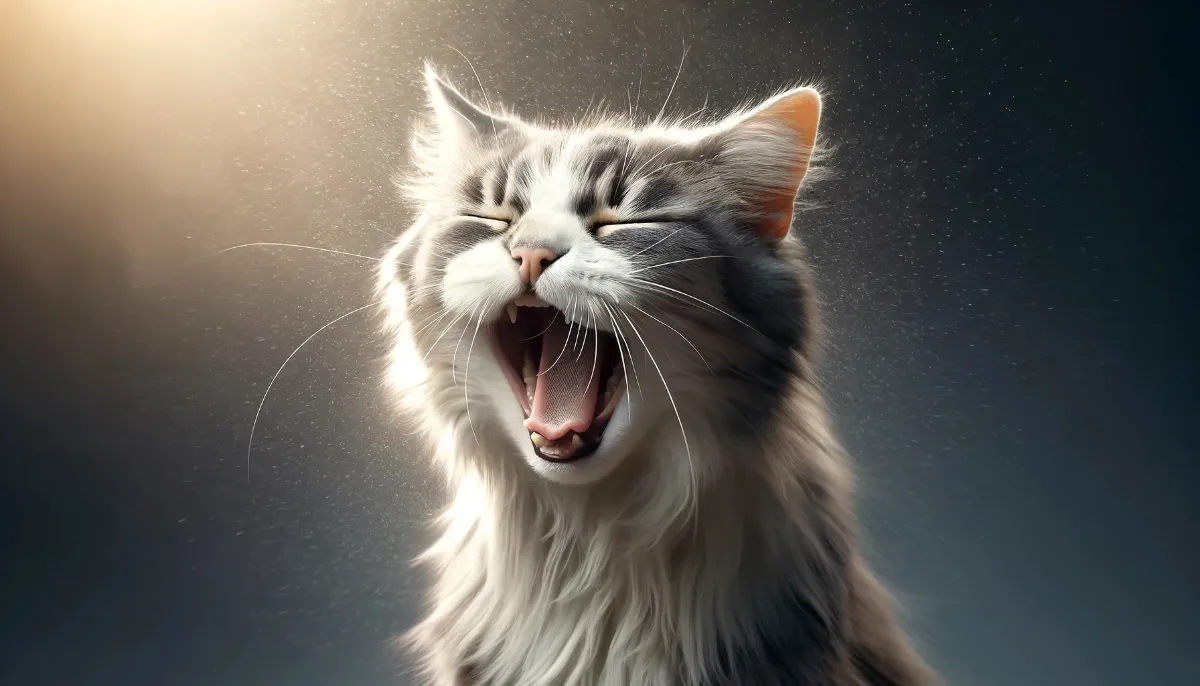
Why is My Cat Sneezing? Uncover the Causes and Solutions
Cat sneezing can be a common concern for pet owners, often leading to worry about their feline friend's health and well-being.
Understanding the reasons behind your cat's sneezing can provide valuable insights into potential health issues and appropriate actions to take. In this comprehensive guide, we'll delve into the various causes of cat sneezing, explore symptoms to watch out for, and provide practical tips to help your cat feel better.
Introduction: Understanding Cat Sneezing
Cat sneezing is a normal physiological response that helps clear the nasal passages of irritants such as dust, pollen, or foreign particles. However, persistent or excessive sneezing can indicate an underlying health problem that requires attention. As responsible pet owners, it's essential to be vigilant about changes in our cat's behavior and seek veterinary advice if necessary.
Common Causes of Cat Sneezing
Understanding the underlying causes of cat sneezing is crucial for providing appropriate care and treatment. Here are some common factors that may contribute to your cat's sneezing episodes:
1. Respiratory Infections:
Respiratory infections, such as feline herpesvirus or calicivirus, are among the leading causes of cat sneezing. These viral infections can result in symptoms like nasal discharge, fever, and lethargy. Prompt veterinary intervention is essential to manage respiratory infections effectively.
2. Allergies:
Just like humans, cats can also experience allergic reactions to various environmental triggers, including pollen, dust mites, mold, or certain foods. Allergies may manifest as sneezing, itching, or skin irritation. Identifying and eliminating the allergen can help alleviate your cat's symptoms.
3. Foreign Objects:
Inquisitive cats may inadvertently inhale small foreign objects like dust, grass, or small toys, leading to sneezing fits. If you suspect your cat has inhaled a foreign object, seek veterinary assistance promptly to prevent complications.
4. Dental Problems:
Dental issues, such as gingivitis or dental abscesses, can cause oral discomfort and lead to sneezing as a reflex response. Regular dental care and veterinary check-ups are essential for maintaining your cat's oral health.
5. Nasal Polyps:
Nasal polyps are benign growths that can develop in your cat's nasal passages, causing obstruction and irritation. Along with sneezing, nasal polyps may cause difficulty breathing and nasal discharge. Surgical removal may be necessary in severe cases.
Recognizing Symptoms of Cat Sneezing
Apart from sneezing itself, several accompanying symptoms may indicate underlying health issues:
- Nasal Discharge: Keep an eye on the color and consistency of nasal discharge, as changes can signify infection or inflammation.
- Watery Eyes: Excessive tearing or discharge from the eyes may indicate an underlying respiratory problem.
- Coughing or Wheezing: Persistent coughing or wheezing warrants immediate veterinary attention to rule out respiratory issues.
Tips for Managing Cat Sneezing
While occasional sneezing is normal for cats, persistent or severe symptoms require veterinary evaluation. Here are some tips to help manage cat sneezing:
- Maintain a Clean Environment: Regularly clean your cat's living space to minimize exposure to dust, allergens, and potential irritants.
- Provide Proper Nutrition: Ensure your cat receives a balanced diet rich in essential nutrients to support their immune system and overall health.
- Monitor for Behavioral Changes: Keep an eye on your cat's behavior and appetite, as changes may indicate underlying health issues requiring veterinary attention.
FAQs (Frequently Asked Questions)
Q: Can I give my cat over-the-counter cold medication?
A: It's essential to consult your veterinarian before administering any medication to your cat, as certain human medications can be toxic to felines.
Q: How can I prevent my cat from inhaling foreign objects?
A: Keep small objects and potential choking hazards out of your cat's reach, and supervise outdoor playtime to minimize the risk of ingesting foreign objects.
Q: Is cat sneezing contagious to other pets?
A: In cases of viral respiratory infections, such as feline herpesvirus, sneezing can be contagious among cats. Keep infected cats isolated to prevent transmission to other pets.
Q: Should I be concerned if my cat sneezes occasionally?
A: Occasional sneezing is normal for cats and usually not a cause for concern. However, if sneezing becomes frequent or is accompanied by other symptoms, consult your veterinarian for a thorough evaluation.
Q: Can allergies cause my cat to sneeze?
A: Yes, cats can develop allergies to various environmental triggers, including pollen, dust, or certain foods, leading to sneezing, itching, or skin irritation.
Q: How can I help alleviate my cat's sneezing?
A: Providing a clean and allergen-free environment, regular veterinary check-ups, and addressing any underlying health issues can help alleviate your cat's sneezing episodes.
Disclaimer: This content is for informational purposes only and is not intended as veterinary advice. I am not a veterinarian. Always consult a qualified veterinarian for diagnosis and treatment of any health issues your cat may be experiencing.
Conclusion: Ensuring Your Cat's Well-being
Cat sneezing can be a common occurrence with various underlying causes, ranging from respiratory infections to allergies and dental problems. By understanding the potential triggers and symptoms of cat sneezing, you can take proactive steps to ensure your feline companion's health and well-being. Remember to consult your veterinarian for personalized advice and treatment options tailored to your cat's specific needs.
